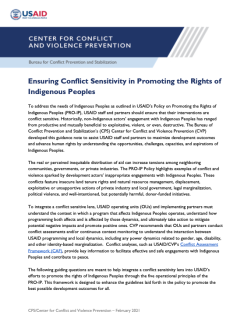To address the needs of Indigenous Peoples as outlined in USAID’s Policy on Promoting the Rights of Indigenous Peoples (PRO-IP), USAID staff and partners should ensure that their interventions are conflict sensitive. Historically, non-Indigenous actors’ engagement with Indigenous Peoples has ranged from productive and mutually beneficial to exploitative, violent, or even, destructive. The Bureau of Conflict Prevention and Stabilization’s (CPS) Center for Conflict and Violence Prevention (CVP) developed this guidance note to assist USAID staff and partners to maximize development outcomes and advance human rights by understanding the opportunities, challenges, capacities, and aspirations of Indigenous Peoples.
The real or perceived inequitable distribution of aid can increase tensions among neighboring communities, governments, or private industries. The PRO-IP Policy highlights examples of conflict and violence sparked by development actors’ inappropriate engagements with Indigenous Peoples. These conflicts feature insecure land tenure rights and natural resource management, displacement, exploitative or unsupportive actions of private industry and local government, legal marginalization, political violence, and well-intentioned, but potentially harmful, donor-funded initiatives.
To integrate a conflict sensitive lens, USAID operating units (OUs) and implementing partners must understand the context in which a program that affects Indigenous Peoples operates, understand how programming both affects and is affected by those dynamics, and ultimately take action to mitigate potential negative impacts and promote positive ones. CVP recommends that OUs and partners conduct conflict assessments and/or continuous context monitoring to understand the interaction between USAID programming and local dynamics, including any power dynamics related to gender, age, disability, and other identity-based marginalization. Conflict analyses, such as USAID/CVP’s Conflict Assessment Framework (CAF), provide key information to facilitate effective and safe engagements with Indigenous Peoples and contribute to peace.
The following guiding questions are meant to help integrate a conflict sensitivity lens into USAID’s efforts to promote the rights of Indigenous Peoples through the five operational principles of the PRO-IP. This framework is designed to enhance the guidelines laid forth in the policy to promote the best possible development outcomes for all.

